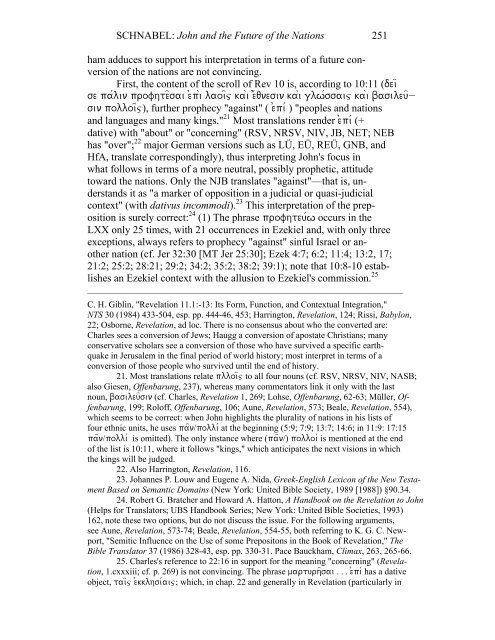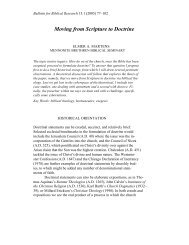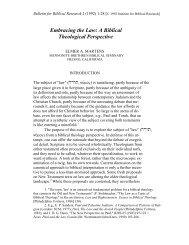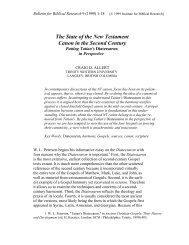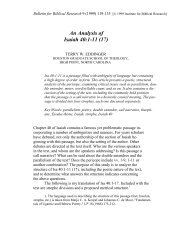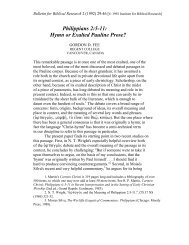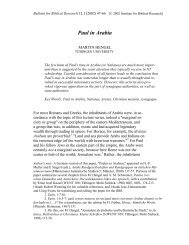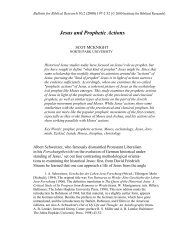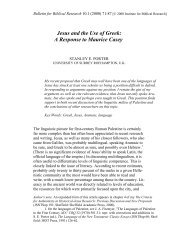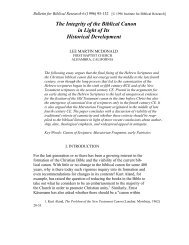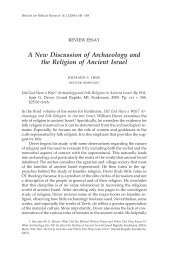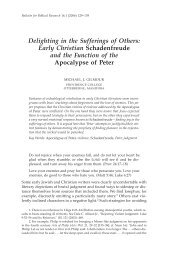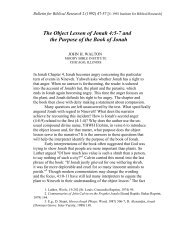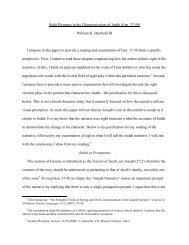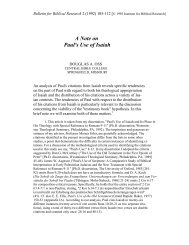John and the Future of the Nations - Institute for Biblical Research
John and the Future of the Nations - Institute for Biblical Research
John and the Future of the Nations - Institute for Biblical Research
Create successful ePaper yourself
Turn your PDF publications into a flip-book with our unique Google optimized e-Paper software.
SCHNABEL: <strong>John</strong> <strong>and</strong> <strong>the</strong> <strong>Future</strong> <strong>of</strong> <strong>the</strong> <strong>Nations</strong> 251<br />
ham adduces to support his interpretation in terms <strong>of</strong> a future conversion<br />
<strong>of</strong> <strong>the</strong> nations are not convincing.<br />
First, <strong>the</strong> content <strong>of</strong> <strong>the</strong> scroll <strong>of</strong> Rev 10 is, according to 10:11 (dei=<br />
se pa/lin pr<strong>of</strong>hte=sai e)pi_ laoi=j kai_ e!qnesin kai_ glw/ssaij kai_ basileu=sin<br />
polloi=j), fur<strong>the</strong>r prophecy "against" ( e)pi/ ) "peoples <strong>and</strong> nations<br />
<strong>and</strong> languages <strong>and</strong> many kings." 21 Most translations render e)pi/ (+<br />
dative) with "about" or "concerning" (RSV, NRSV, NIV, JB, NET; NEB<br />
has "over"; 22 major German versions such as LÜ, EÜ, REÜ, GNB, <strong>and</strong><br />
HfA, translate correspondingly), thus interpreting <strong>John</strong>'s focus in<br />
what follows in terms <strong>of</strong> a more neutral, possibly prophetic, attitude<br />
toward <strong>the</strong> nations. Only <strong>the</strong> NJB translates "against"—that is, underst<strong>and</strong>s<br />
it as "a marker <strong>of</strong> opposition in a judicial or quasi-judicial<br />
context" (with dativus incommodi). 23 This interpretation <strong>of</strong> <strong>the</strong> preposition<br />
is surely correct: 24 (1) The phrase pr<strong>of</strong>hteu/w occurs in <strong>the</strong><br />
LXX only 25 times, with 21 occurrences in Ezekiel <strong>and</strong>, with only three<br />
exceptions, always refers to prophecy "against" sinful Israel or ano<strong>the</strong>r<br />
nation (cf. Jer 32:30 [MT Jer 25:30]; Ezek 4:7; 6:2; 11:4; 13:2, 17;<br />
21:2; 25:2; 28:21; 29:2; 34:2; 35:2; 38:2; 39:1); note that 10:8-10 establishes<br />
an Ezekiel context with <strong>the</strong> allusion to Ezekiel's commission. 25<br />
_______________________________________________________________________<br />
C. H. Giblin, "Revelation 11.1:-13: Its Form, Function, <strong>and</strong> Contextual Integration,"<br />
NTS 30 (1984) 433-504, esp. pp. 444-46, 453; Harrington, Revelation, 124; Rissi, Babylon,<br />
22; Osborne, Revelation, ad loc. There is no consensus about who <strong>the</strong> converted are:<br />
Charles sees a conversion <strong>of</strong> Jews; Haugg a conversion <strong>of</strong> apostate Christians; many<br />
conservative scholars see a conversion <strong>of</strong> those who have survived a specific earthquake<br />
in Jerusalem in <strong>the</strong> final period <strong>of</strong> world history; most interpret in terms <strong>of</strong> a<br />
conversion <strong>of</strong> those people who survived until <strong>the</strong> end <strong>of</strong> history.<br />
21. Most translations relate plloi=j to all four nouns (cf. RSV, NRSV, NIV, NASB;<br />
also Giesen, Offenbarung, 237), whereas many commentators link it only with <strong>the</strong> last<br />
noun, basileu=sin (cf. Charles, Revelation 1, 269; Lohse, Offenbarung, 62-63; Müller, Offenbarung,<br />
199; Rol<strong>of</strong>f, Offenbarung, 106; Aune, Revelation, 573; Beale, Revelation, 554),<br />
which seems to be correct: when <strong>John</strong> highlights <strong>the</strong> plurality <strong>of</strong> nations in his lists <strong>of</strong><br />
four ethnic units, he uses pa=n/polli/ at <strong>the</strong> beginning (5:9; 7:9; 13:7; 14:6; in 11:9: 17:15<br />
pa=n/polli/ is omitted). The only instance where (pa=n/) polloi/ is mentioned at <strong>the</strong> end<br />
<strong>of</strong> <strong>the</strong> list is 10:11, where it follows "kings," which anticipates <strong>the</strong> next visions in which<br />
<strong>the</strong> kings will be judged.<br />
22. Also Harrington, Revelation, 116.<br />
23. Johannes P. Louw <strong>and</strong> Eugene A. Nida, Greek-English Lexicon <strong>of</strong> <strong>the</strong> New Testament<br />
Based on Semantic Domains (New York: United Bible Society, 1989 [1988]) §90.34.<br />
24. Robert G. Bratcher <strong>and</strong> Howard A. Hatton, A H<strong>and</strong>book on <strong>the</strong> Revelation to <strong>John</strong><br />
(Helps <strong>for</strong> Translators; UBS H<strong>and</strong>book Series; New York: United Bible Societies, 1993)<br />
162, note <strong>the</strong>se two options, but do not discuss <strong>the</strong> issue. For <strong>the</strong> following arguments,<br />
see Aune, Revelation, 573-74; Beale, Revelation, 554-55, both referring to K. G. C. Newport,<br />
"Semitic Influence on <strong>the</strong> Use <strong>of</strong> some Prepositons in <strong>the</strong> Book <strong>of</strong> Revelation," The<br />
Bible Translator 37 (1986) 328-43, esp. pp. 330-31. Pace Bauckham, Climax, 263, 265-66.<br />
25. Charles's reference to 22:16 in support <strong>for</strong> <strong>the</strong> meaning "concerning" (Revelation,<br />
1.cxxxiii; cf. p. 269) is not convincing. The phrase marturh=sai . . . e)pi/ has a dative<br />
object, tai=j e)kklhsi/aij; which, in chap. 22 <strong>and</strong> generally in Revelation (particularly in


